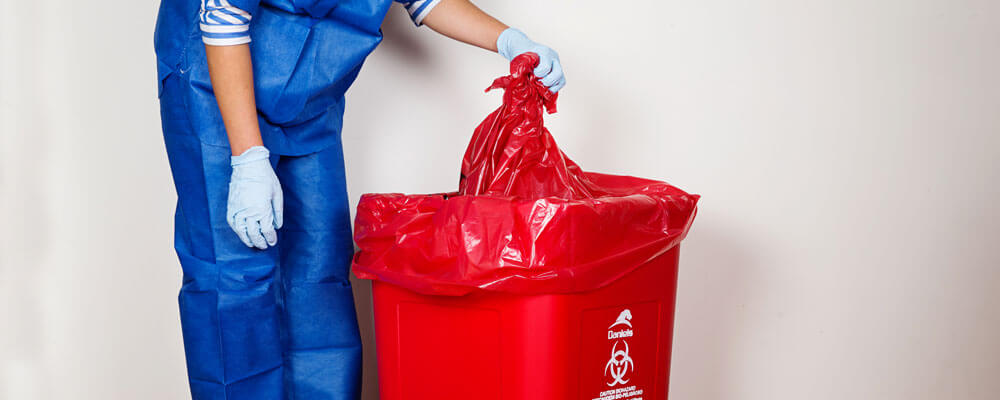Tailored Medical Waste Disposal Services: Custom Solutions for Your Requirements
Tailored Medical Waste Disposal Services: Custom Solutions for Your Requirements
Blog Article
Navigating Medical Waste Disposal: Crucial Providers for Health Care Facilities
In the elaborate landscape of medical care operations, the monitoring of clinical waste is a critical facet that requires meticulous focus. Healthcare centers, whether small clinics or big healthcare facilities, are entrusted with the obligation of handling, dealing with, and dealing with a wide variety of medical waste streams. The intricacies associated with navigating through the governing demands, making certain appropriate waste partition, and implementing safe collection and transport procedures are vital. Understanding the essential solutions that support medical waste disposal is not just a matter of conformity however additionally a basic component in securing public health and wellness and ecological health. The complexities of this procedure are important for health care centers, and the know-how supplied in this realm plays a pivotal function in maintaining the stability of medical care systems.
Regulatory Compliance Support
For medical care facilities, making sure regulative conformity assistance is vital to keep proper handling and disposal of medical waste. Sticking to policies stated by organizations such as the Environmental Security Agency (EPA) and the Occupational Safety And Security and Health And Wellness Management (OSHA) is critical to stop environmental contamination, safeguard public wellness, and avoid prospective lawful consequences. Regulative conformity assistance provides healthcare facilities with support on how to properly set apart, store, transport, and take care of different sorts of clinical waste based on neighborhood, state, and federal regulations. This support consists of aid in creating and executing extensive waste management plans, carrying out regular personnel training sessions, and performing audits to ensure recurring compliance. By partnering with regulatory compliance professionals, healthcare centers can stay current on developing laws, minimize threats connected with incorrect waste disposal, and ultimately add to a more secure and extra sustainable atmosphere for all.
Waste Segregation Support

Healthcare facilities should provide clear standards and training to team on how to segregate waste properly. This consists of dividing basic waste from harmful products such as sharps, contagious waste, drugs, and chemical waste. Color-coded containers, tags, and signage are typically utilized to aid in waste segregation practices. Routine audits and surveillance of waste segregation procedures are vital to recognize any kind of concerns and make necessary enhancements.
Collection and Transport Solutions

Proper collection and transport solutions are essential parts of the clinical waste disposal procedure in medical care centers. These solutions ensure that harmful products are handled securely and in conformity with policies to safeguard both the setting and public Get the facts health. Medical care facilities count on specialized waste administration companies to offer effective collection and transportation solutions customized to their demands.
Clinical waste collection involves setting apart various kinds of waste at the factor of generation, using color-coded bins or bags to compare basic, hazardous, pharmaceutical, and various other waste streams. Educated workers have to do this job to avoid contamination and guarantee proper disposal. Once collected, the waste is carried in committed vehicles outfitted to manage unsafe products securely. These automobiles follow strict security requirements and comply with designated routes to certified treatment centers for disposal through techniques such as landfilling, sterilization, or incineration.
Treatment and Disposal Solutions
In the realm of medical garbage disposal for healthcare facilities, after the essential phase of collection and transport solutions, the emphasis changes towards implementing reliable therapy and disposal remedies. Therapy options usually include processes such as autoclaving, which utilizes heavy steam under pressure to sanitize the waste. This approach is typically made use of for infectious waste that must be made non-hazardous prior to disposal. An additional common treatment method is incineration, where waste goes through high temperatures in controlled settings to lower its quantity and remove virus.
Disposal solutions incorporate the final step in the clinical waste monitoring process. Reusing and source recovery are also acquiring traction as lasting disposal options for specific types of clinical waste products.
Effective treatment and disposal remedies are extremely important in ensuring compliance with regulations and guarding public reference health and wellness and the environment. Healthcare centers should very carefully assess and choose suitable methods that line up with their waste monitoring objectives and sustainability efforts.
Team Training and Education And Learning

To properly take care of clinical waste disposal in health care centers, extensive team training and education play a vital role in ensuring adherence to governing requirements and maintaining a safe atmosphere. Appropriate training furnishes personnel with the understanding and skills needed to manage various sorts of clinical waste, segregate them correctly, and package them safely for disposal. By educating staff members on the risks associated with inappropriate handling of medical waste, centers can decrease the likelihood of crashes, contamination, and regulative infractions.

Verdict
In conclusion, healthcare facilities count on vital clinical garbage disposal solutions to ensure regulatory compliance, proper waste segregation, secure collection and transport, efficient treatment and disposal, in addition to personnel training and education and learning. These services play a vital function in preserving the health and wellness and safety and security of both medical care employees and the public, highlighting the relevance of correct administration of anonymous medical waste in health care setups.
For health care facilities, guaranteeing regulative conformity assistance is important to preserve proper handling and disposal of clinical waste. Waste segregation involves classifying different types of clinical waste to make certain proper handling, treatment, and disposal. This includes dividing general waste from harmful materials such as sharps, infectious waste, drugs, and chemical waste.Clinical waste collection involves setting apart various types of waste at the factor of generation, utilizing color-coded bins or bags to identify between general, harmful, pharmaceutical, and other waste streams.In the world of medical waste disposal for healthcare centers, after the essential phase of collection and transportation solutions, the focus shifts in the direction of carrying out effective therapy and disposal solutions.
Report this page